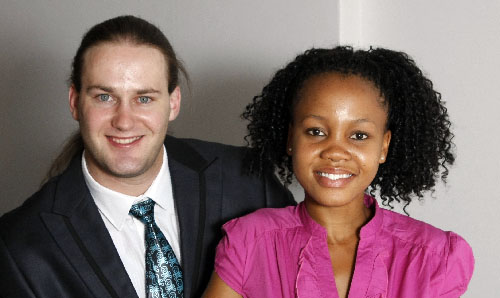Latest News Archive
Please select Category, Year, and then Month to display items
12 January 2024
|
Story Nonsindiswe Qwabe
|
Photo Sonia Small
 Since joining the UFS in 2008, Dr Grey Magaiza has worked extensively on approaches that can foster the socio-economic transformation of societies.
Since joining the UFS in 2008, Dr Grey Magaiza has worked extensively on approaches that can foster the socio-economic transformation of societies.
“The future should be one where communities can decide on their development agenda and futures. That’s the most important for me.” Dr Grey Magaiza, Deputy Director of the Centre for Gender and Africa Studies (CGAS) and Head of the Community Development programme on the Qwaqwa Campus, is passionate about capacitating communities to be agents of change and advancement. His vision for the future emphasises the empowerment of communities to take charge of their development by actively participating in decision making and the implementation of development projects that can improve their lives.
Since joining the UFS in 2008, Dr Magaiza has worked extensively on approaches that can foster the socio-economic transformation of societies. Over the years, he has crafted his research speciality into one that he is most proud of – being an interdisciplinary scientist immersed in the development of communities.
“I’m in a fortunate position of researching what I like. I say ‘fortunate’, because I’ve taken the time to understand what I’m passionate about, which is the overall field of rural livelihoods and livelihood futures – in short, community development. My research starts from an engaged university, understanding the elements that a university must use to enhance transformation and relevance to its immediate community in terms of development.”
One of the ways he has done this is by looking at social entrepreneurship as a development approach for young people in a rural setting. Through workshops with non-profit and civic organisations in Qwaqwa, Dr Magaiza has been helping these organisations to map out their needs and actively meet them through the involvement and support of external role players.
“We understand that communities are part of the national development agenda, but even that national agenda respects community knowledge and intentions and allows communities to shape their identity. A critical enabler of this is community organising. You bring back the capacity in communities to have dialogues on issues affecting them as spaces for engagement, knowledge exchange, and for people to just talk about their way forward.”
By enabling communities to define their development agenda, they can address their specific needs, challenges, and aspirations, he said. “When I look at livelihood futures, it’s quite an exciting aspect of my work – it’s like looking into a fortune tellers’ globe, because you’re not deciding for communities what they should do, but the communities themselves take those decisions.”
Two Rhodes scholars are doing the UFS proud
2010-12-09
 |
| Sannah Mokone and DW Bester |
Sannah Mokone and DW Bester were selected as Rhodes Scholars for 2011. It is the first time that the UFS has two students who have been awarded this sought-after scholarship in the same year.
Sannah is currently completing her B.Pub.Hons degree at the UFS and will read for an M.Sc. in Africa Studies at Oxford. DW is completing his honours degree in Actuarial Science and will read for a D.Phil.
The UFS is honoured to have not only one but two students who will join the ranks of past Rhodes Scholars such as Justice Edwin Cameron, Dr David Woods, Adv. Bram Fisher, Dr Loyiso Nongxa, Mr Isaac Shongwe and Mr Kumi Naidoo, who was recently appointed as the Executive Director of Greenpeace International.
The Rhodes Scholarships, arguably one of the most prestigious scholarships in the world, were founded in 1903 in the will of Cecil John Rhodes and cover the full costs of study at Oxford University.
While academic excellence is a pre-condition for consideration for the Rhodes Scholarship, these scholarships are unique in that Rhodes Scholars are outstanding young students who excel academically, but very importantly, demonstrate leadership, are committed to making a difference in the world, and have the energy to fulfil their ambitions.
In the Southern African region four scholarships are available for South African residents in general; as well as one for KwaZulu-Natal; and one each for the alumni of Diocesan College, Paul Roos Gymnasium, St Andrew’s College and the South African College Schools (SACS). There is a further scholarship available for residents of Botswana, Lesotho, Malawi, Namibia and Swaziland.
DW and Sannah were each awarded one of the South Africa-at-large scholarships.
Media Release
9 December 2010
Issued by: Lacea Loader
Director: Strategic Communication (actg)
Tel: 051 401 2584
Cell: 083 645 2454
E-mail: news@ufs.ac.za